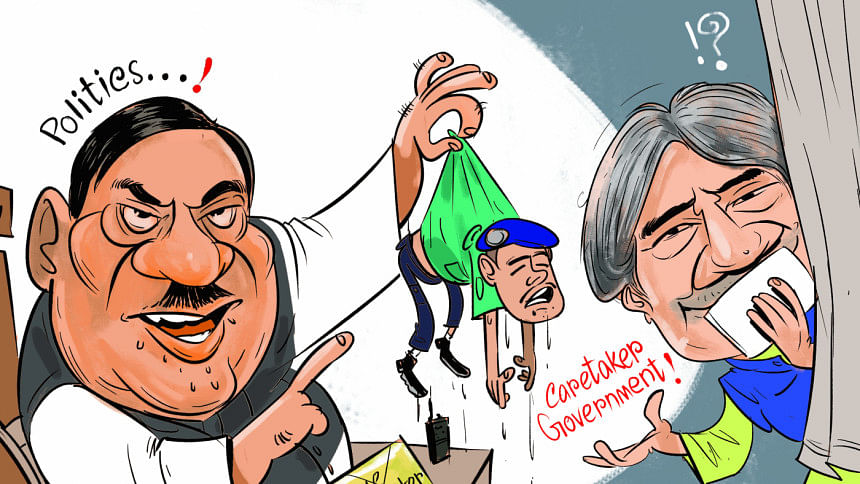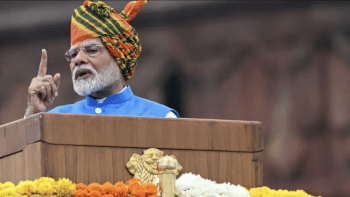Awami League’s melodramatic redemption arc

The ongoing political narrative surrounding the Awami League (AL) seems to be an attempt at rewriting its history—a curious exercise in portraying itself as a victim after years of wielding unbridled power. While some might view this as a natural turn of events in the cycle of politics, others find it to be an astonishing display of hypocrisy and irony.
If politics were a theatre, Asaduzzaman Khan Kamal and his ilk would be worthy of Oscars for their tragicomic renditions of "Victims of Circumstance" and "The Forgotten Heroes." Only this time, the audience isn't clapping; they're rolling their eyes.
In a recent interview with the Indian Express, the former home minister delivered a soliloquy so riddled with irony that even the most skilled satirists would struggle to script it. Kamal admitted to an intelligence failure during the July uprising of 2024, lamenting how 460 police stations were torched, thousands of weapons looted, and chaos reigned supreme. To top it off, he boldly blamed a "joint coup of Islamic extremism and the army" for the government's fall.
But let's rewind the reel to his own tenure. Remember the years when police stations didn't need to burn because dissent was already smothered in the flames of crossfires and enforced disappearances? During his party's reign, anyone daring to speak out against the regime was silenced, often permanently. Yet here he stands, bemoaning the inefficacy of the same police force he once weaponised. It's akin to a firefighter who moonlights as an arsonist lamenting the spread of flames. Kamal's lament is like a chef blaming his burnt soufflé on the oven—completely ignoring his own recipe for disaster.
Mohammad A Arafat, another AL luminary, recently took to Facebook to demand elections under a caretaker government. Yes, you heard that right—the very system they demonised, abolished, and declared unconstitutional is now their chosen sanctuary. It's as if someone who insisted on drinking seawater for years suddenly complains about dehydration.
For those who've forgotten, AL spent three consecutive elections—2014, 2018 and 2024—under their own political regime, systematically dismantling the caretaker system to cement their autocracy. Their justification? Caretaker governments, they claimed, were a breeding ground for instability and conspiracies. Fast forward to 2025, and here they are, weeping for its resurrection. The hypocrisy could power an entire season of House of Cards.
Let's talk about the crimes that AL leaders conveniently overlook in their newfound role as victims. Under their watch, the nation witnessed extrajudicial killings euphemistically dubbed "crossfires." Innocent citizens, political opponents, and journalists were subjected to a reign of terror. The streets of Dhaka were painted red, not with the colours of revolution, but with the blood of innocents. The frightening reports of people disappearing overnight were treated as just another day in the AL's kingdom.
One could argue that the AL's rule was a masterclass in dystopian governance. If Orwell's 1984 were ever to be adapted into a Bangladeshi context, their regime would serve as the perfect blueprint. Surveillance? Check. Thought control? Double check. Fear as a tool of governance? Triple check. Their tenure redefined the term "big brother" and not in the reality-TV sense.
Kamal's lament about the "morale" of AL workers being high is as believable as claiming that Walter White cooked meth for charity. He wistfully spoke of Sheikh Hasina's transformative leadership, citing her economic achievements. But where were these accolades when the economy spiralled into inflation, and essential goods became luxuries? The price of onions soared so high that they became a symbol of wealth, and the middle class found themselves nostalgic for days when a simple fish curry didn't break the bank.
And let's not forget the AL's media stranglehold. During their tenure, newspapers were muzzled, journalists were imprisoned, and social media became a hunting ground for dissenters. Yet today, they whine about media bias under the interim government. It's like a monopolist complaining about competition.
If the AL's current predicament were a Bollywood film, it would be titled Ghar Ghar Mein Hypocrisy. Picture Kamal as a tragic hero, spouting lines like, "Main woh insaan hoon jo apne hi banaye huye system se haar gaya" (I am the man defeated by my own system). Meanwhile, Arafat's Facebook status could be the perfect script for a villain's monologue, demanding justice while ignoring the skeletons in his own closet. Their melodramatic shift from authoritarian overlords to misunderstood victims deserves its own soundtrack.
Kamal's claim that "everything has turned 360 degrees" is unintentionally accurate. A full circle indeed, as the AL now finds itself in the very position it worked so hard to eliminate—pleading for fairness, justice, and democracy. The irony is almost poetic, like a snake biting its own tail. Except this snake spent years assuring everyone it was a dove.
From Game of Thrones to Breaking Bad, pop culture is rife with cautionary tales about power and its corrupting influence. The AL's saga is no different. Their fall from grace serves as a stark reminder that unchecked power inevitably leads to ruin. It's like Walter White lamenting the moral decay of the meth industry or Cersei Lannister criticising unethical leadership practices.
The AL often boasted about their electoral victories as proof of public support. But in a country where elections were marred by allegations of ballot-box stuffing, intimidation, and outright fraud, these claims hold as much water as a sieve. The phrase "public mandate" was weaponised to justify their grip on power, ignoring the disillusionment simmering among ordinary citizens.
Ironically, the same party that dismissed peaceful protests as "foreign conspiracies" now attempts to portray itself as the defender of democracy. Their narrative is as believable as a thief crying foul when caught red-handed. They demand an impartial system, conveniently forgetting their systematic efforts to erode democratic norms for over a decade.
Under AL's rule, silence became a survival strategy. Academics, activists, and ordinary citizens were forced to self-censor, lest they invite the wrath of the regime. The state apparatus functioned as an omnipresent spectre, watching and punishing dissent. The culture of fear they cultivated is a scar on the nation's psyche—one that will take years to heal.
Now, in an ironic twist, AL leaders lament the lack of "freedom of expression" under the interim government. Their cries would be laughable if they weren't so infuriating. It's like an authoritarian mourning the loss of their own dictatorship.
The people of Bangladesh have spoken, and their message is clear: enough is enough. No amount of crocodile tears or revisionist narratives can erase the AL's legacy of oppression. Their cries for justice and democracy ring hollow, echoing the hypocrisy of a regime that trampled those very ideals. The public is now the discerning critic, refusing to buy tickets to a show they've seen too many times before.
So, as Kamal dreams of a "short time" for recovery and Arafat rallies for a caretaker government, one can't help but chuckle at the absurdity. The AL's redemption arc is less a phoenix rising from the ashes and more a circus act fumbling its way through a dark comedy. The curtain has fallen on their melodrama, and the only applause they're receiving is the sound of people turning their backs.
H. M. Nazmul Alam is lecturer at the Department of English and Modern Languages of the International University of Business, Agriculture and Technology (IUBAT). He can be reached at [email protected].
Views expressed in this article are the author's own.
Follow The Daily Star Opinion on Facebook for the latest opinions, commentaries and analyses by experts and professionals. To contribute your article or letter to The Daily Star Opinion, see our guidelines for submission.

 For all latest news, follow The Daily Star's Google News channel.
For all latest news, follow The Daily Star's Google News channel. 






Comments